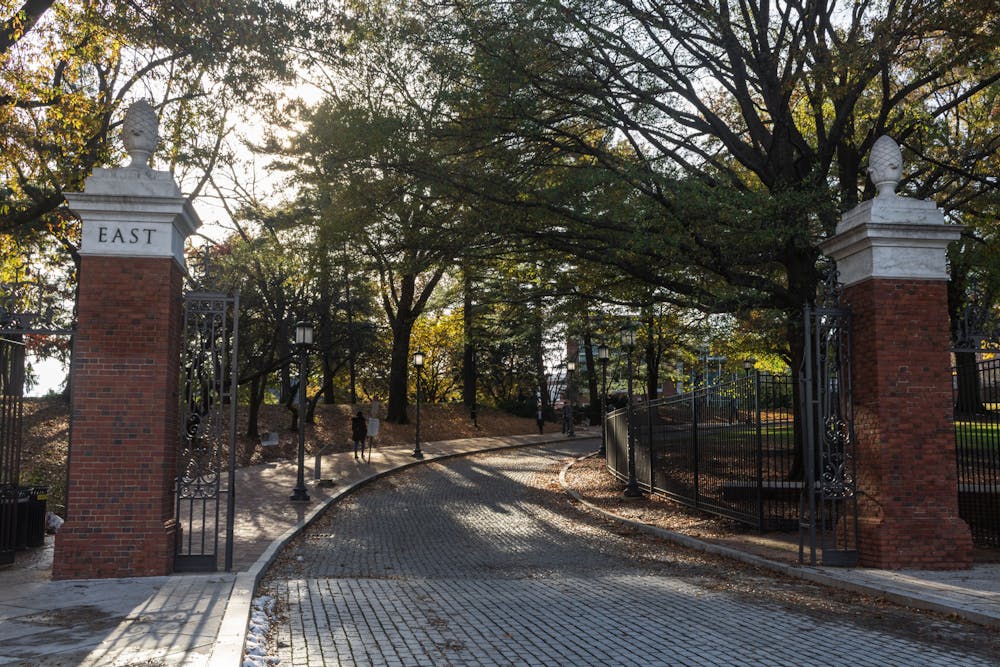The College Democrats of Maryland hosted a gubernatorial debate between democratic primary candidates Jon Baron and Ashwani Jain on April 15. They outlined their plans for implementing educational, environmental, infrastructural and safety policies.
Students proposed the questions that were asked during the debate. Junior Raymond Perez, the debate moderator and president of the College Democrats of Maryland, explained the purpose of the event in an email to The News-Letter.
“I hope students take away [from the debate] that they actually do have political power and that they can be listened to by politicians,” he wrote.
In Baron’s opening statement, he emphasized that he is running for governor because he feels that he will offer a different approach to politics by solving problems using evidence-based solutions.
“Many programs, no matter how well-intentioned they may be, just don’t work, as we see too often when the results are measured,” he said. “So to make progress we have to expand solutions that don’t just sound good but have actually been tested in the real world and shown to make a big difference in people’s lives.”
Jain’s opening statement highlighted his desire to make politics inclusive and accessible. He discussed his experience battling cancer at the age of 13, where having his life controlled by others made him recognize the importance of making decisions with others rather than for others.
“I believe decisions about us should not be made without us, because when you speak about any issue, if residents are not given a seat at the table, then none of those policies will be equitable,” he said.
Perez addressed the candidates’ plans for education policy, which include making higher education equitable and alleviating student loan debt at the debate.
Baron plans to create a Bottom Line program in Maryland. The program pairs low-income, first-generation college students with an advisor during their senior year of high school. Advisors provide students with advice on the college application process and continue to advise them throughout their college careers.
In an email to The News-Letter, Andrew Pierson, a sophomore at Towson University, highlighted the importance of Baron’s Bottom Line program.
“I really liked Jon Baron's stance in many issues, which aligned with mine, especially about his Bottom Line program for low-income students,” he wrote.
Jain, who noted that he is still paying off his student loan debt, described his signature student loan debt relief plan. The plan involves expanding the current state student loan debt relief tax credit, giving undocumented immigrants in-state tuition, ensuring good internships and jobs, providing a reduced cost of living for students and easing student loan debt for educators.
“Forgiving student debt for educators who teach at our schools for at least six years is a good starting point,” he said. “I think [we should be] looking at how we provide tangible benefits immediately and, at the federal level, advocating for entirely wiping out student debt, which they’ve been pushing off.”
The candidates also discussed their plans for environmental action.
Baron outlined his proposal to expand the Regional Greenhouse Gas Initiative to more carbon-emitting sectors of society, which will require them to stay within a cap on carbon emissions.
Jain stated that he is proud that his entire climate change policy memo is on his website, which is available for free for public use. His plan includes reforming the commissions on environmental justice and public service; creating more designated bus lines; investing in more solar, hydro, and wind power; banning single-use plastic bags and improving composting among other initiatives.
Jain added that he worked with residents to compose his plan.
“Those who are actually at the forefront of some of these environmental damages are actually communities of color or low-income neighborhoods,” he said. “So making sure that those people have a seat at the table, and helped make all the policies I just mentioned, goes a long way in terms of sustainability and equity.”
During the infrastructure portion of the debate, both candidates expressed strong support for creating a Red Line in Baltimore, which would connect the city’s east and west sides through public transportation.
Baron added that he plans to tackle issues of building infrastructure like the Red Line differently than current Governor Larry Hogan. He emphasized that he would prioritize selecting contractors who can be trusted to complete projects in an efficient and timely manner.
“It is essential if we are going to complete these projects on time and within budget to select contractors who have a demonstrated history of completing major infrastructure projects on time and within budget,” he said.
Candidates also discussed marijuana legalization.
Jain stated that he plans to both legalize marijuana and expunge records for those convicted of crimes related to marijuana. He emphasized that he views marijuana conviction as a racial inequity issue.
“Black and white Americans... use marijuana at similar rates, but Black Americans are three to four times more likely to be arrested and criminalized,” he said.
Though Baron has never used marijuana himself, he supports it being on the ballot and will vote for its legalization. He added that he would use its tax revenue to support school-based programs that have been proved to prevent substance abuse.
In the debate’s final section on safety policies, both candidates expressed a desire to reduce gun violence and ensure residents are vaccinated against COVID-19.
In an interview with The News-Letter, Jain highlighted that he chose to participate in the debate to give students the opportunity to interact directly with politicians.
“I value your voice as college students, as young people, and I wanted to give you the respect of being able to ask questions,” he said. “I want to make sure this process of politics is transparent, inclusive and accessible.”





